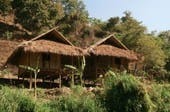Chiang Mai, once the capital of the Lanna Kingdom founded in the 13th century, is one of thailand’s ancient cities and is regarded as having a cultural personality all of its own. Away from the city you will find Chiang Mai surrounded by Meadows, rivers, waterfalls, forests, mountains and valleys stemming from the base of the Himalayas. You will have a very diverse experience when you study an ITTT tefl/tesol course in Chiang Mai, Thailand.
The architecture in Chiang Mai clearly highlights the influences of Lanna, Thai, Sri Lanka, Burma and Mon. The city also has a vast amount of history and is home to 300 temples, some of which Date back over 500 years. They include the wonderful Wat Phrathat Doi Suthep which was built in 1383, Wat Phra Singh which was built around 1400 and Wat Chiang Man where the oldest temple is said to date back to the founding year of the city (1292). In recent times, the city of Chiang Mai has undergone a period of regeneration but has still managed to retain its cultural identity.
Chiang Mai maintains a tropical climate with the monsoon season arriving from India in late May. The temperature around this time of year ranges from 23-32 °C or 73-90 °F. The season stays until November when the temperature ranges from 19-30 °C or 66-80 °F. During the monsoon season the rain usually falls for a couple of hours in the afternoon. During November to May Chiang Mai experiences milder weather with the cool air coming from China, temperatures during this dry season range from 13-36 °C or 55-97 °F.
The cost of living is Chiang Mai is one of the cheapest in Thailand. See below for an idea of costs in USD:
1.00 - Hot meal 1.20 - Bottle of beer 0.20 - Bottle of water 0.50 - 20-minute motorbike taxi rideWhy Chiang Mai?
Chiang Mai has over 300 temples, an appealing historical atmosphere and a stunning mountain setting. This location is a modern, welcoming and international city providing a long list of attractions for visitors. Accommodation, food and shopping are also first rate and inexpensive.
Apply now & get certified to teach english abroad!The School
Our TEFL/TESOL training centre in Chiang Mai is located outside old Chiang Mai’s ‘Walled City’ and near the trendy Nimmanhaemin area.
The training center is well situated for a brief motorbike, bus or tuk-tuk ride into the appealing city centre, the night market and a variety of shops and restaurants.
The center is just a short distance from the local schools at which you’ll conduct your teaching practice. These schools are linked with local temples and are geared towards the community’s underprivileged children. Students are very receptive to Western teachers and our long-term commitment to these schools and the surrounding community means you’ll get a chance to see a side of Chiang Mai that average travelers will never be able to see.
With the help of our experienced training staff, you’ll deliver lessons to real EFL students who do not speak English as their native language. Students are enthusiastic and provide a supportive environment in which to learn the skills needed to become an effective teacher. In addition to the trainers and students, our office staff are helpful, diligent and will make every effort to help you throughout your training.
Accommodation
Chiang Mai benefits from a wide choice of accommodation to suit all price ranges. Budget hostels can be found for as little as $150 per month and more comfortable hotels, guesthouses and small condos are available from $ 200 to $300 per month.
Some sample accommodation options, with pricing in Thai baht:
Suite: (56 sq m): 18,000 baht / month
- Air conditioning with remote control
- King size bed
- Working desk and chair
- Dining table with two chairs
- Wardrobe
- Hot water heater
- Pantry
- Fridge
- Cable TV
- All modern style furniture
Superior deluxe: (35 sq m): 7,500 baht / month
- Air conditioning with remote control
- One 5 foot bed or two 3.5 foot beds
- Working desk and chair
- Wardrobe
- Hot water heater
- Pantry
- Fridge
- Cable TV
- Rooftop Swimming Pool
VIP (30 sq m): 6,500 baht / month
- Air con with remote control
- One 5 foot bed or two 3.5 foot beds
- Working desk with chair
- Cable TV
- Fridge
- Wardrobe
- Hot water heater
- Swimming Pool
Standard (25 sq m): 5,500 baht / month
- Air con
- One 5 feet or two 3.5 feet bed
- Cable TV
- Wardrobe
- Hot water heater
Course dates
 Coming soon...
Coming soon...Please check out our other course locations if you wish to attend a course before this one becomes available...
Course fees
The total price is divided into: deposit and balance.
The deposit may be paid via a) credit card b) Paypal c) wire transfer d) Western Union.
The balance of the course fee must be paid by cash, PayPal or bank transfer directly to the training center on the first day of the course.
US$ 600
US$ 990
Accomodation Fees
The accommodation fees are not part of the course price and you are free to choose whichever accommodation option you prefer.
If you choose to use our accommodation, it should be paid for either by cash, PayPal or bank transfer directly to the school at the start of the course.
US$ 150

















